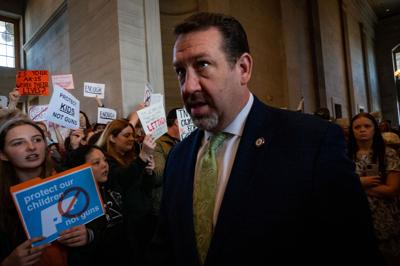
House Republican Caucus Chair Jeremy Faison passes protestors calling for gun restrictions at the state Capitol, March 30, 2023.
Months after a shooting at Covenant School in Nashville left three children and three staff members dead, Gov. Bill Lee has formally called the special legislative session he promised in response to the killings.
Lee, a Republican, has called the Tennessee General Assembly back to Nashville starting Aug. 21. The Republicans who control the legislature have already made it clear they do not plan to support Lee's proposed extreme risk protection order legislation. (One key Republican, Lt. Gov. Randy McNally, has expressed support for ERPOs, which allow courts to temporarily remove guns from people in crisis.)
Three-fourths of Tennessee voters support so-called "red flag" laws, according to recent Vanderbilt University polling. According to a release, Lee is not including ERPOs in his administration legislative package, but the call leaves open the possibility that a lawmaker could propose related legislation.
Parents of Covenant students are among those urging the legislature to enact legislation that could help prevent future tragedies.
Katy Dieckhaus, whose 9-year-old daughter Evelyn was killed at Covenant, recently recorded an advertisement in partnership with nonprofit Voices for a Safer Tennessee calling for "responsible firearm safety laws that will work towards protecting our children and their right to life."
Lawmakers are limited in what they can consider in a special session. Lee's proclamation includes the following possible areas of discussion:
- mental health resources, providers, commitments or services
- school safety plans or policies
- health care providers' duty to warn about potential violent offenses
- offenses of committing acts of mass violence or threatening to commit acts of mass violence
- reports from the Tennessee Bureau of Investigation regarding human trafficking
- identification of individuals arrested for felonies
- law enforcement's access to criminal and juvenile records
- law enforcement's access to information about individuals who are subject to mental health commitment
- information about victims of violent offenses
- stalking offenses
- measures encouraging the safe storage of firearms, which do not include the creation of penalties for failing to safely store firearms
- temporary mental health orders of protection, which must be initiated by law enforcement, must require a due process hearing, must require the respondent to undergo an assessment for suicidal or homicidal ideation, must require law enforcement to prove its case by clear and convincing evidence, must require that an order of protection be reevaluated at least every 180 days, and must not permit ex parte orders
- the transfer of juvenile defendants aged 16 and older to courts with criminal jurisdiction, which must include appeal rights for the juveniles and the prosecuting authorities
- limiting the circumstances in which juvenile records may be expunged
- blended sentencing for juveniles
- offenses related to inducing or coercing a minor to commit an offense
- the structure or operations of state or local courts
- making appropriations related to the legislation
“A promise to do something to stop future shootings was made to Covenant parents, but sadly this proclamation eliminates many paths forward," says Sen. Raumesh Akbari, leader of the Senate Democratic Caucus. "While the narrow focus of this special session is frustrating, it will not stop Senate Democrats from fighting for reforms that directly address the epidemic of gun violence in our communities."





